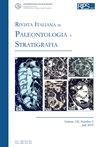螳螂草蛉蛹的首次化石记录,螳螂科蛹的研究进展及其进化意义
IF 1.9
3区 地球科学
Q2 GEOLOGY
引用次数: 1
摘要
在个体发育过程中,昆虫可以经历相当剧烈的变化(变态),直到达到成虫阶段。在一组昆虫中,这种发育的很大一部分发生在蛹阶段。尽管蛹被认为是一个重要的阶段,但在文献中很少有蛹的描述。我们在此报告首次发现草蛉类螳螂科的蛹化石。该标本代表一种蜕皮,被包裹在始新世的乌克兰Rovno琥珀中(约35-40万年)。我们回顾了在文献或在线图像库中描述的现存螳螂科蛹的全部记录。利用椭圆傅立叶分析,比较了螳螂科蛹和成虫的前腿大腿骨(成虫的捕食附属物)的轮廓。蛹在股骨方面都非常相似,而成虫表现出更大的形态多样性,特别是已灭绝的形态。此外,我们的研究结果表明,前腿在个体发育阶段并没有变得越来越复杂,而是经历了一个间接的发展。根据螳螂科蛹期形态的低变异,它似乎代表了该类群的一个种型阶段,即一个显著低于其他阶段的变异性阶段。本文章由计算机程序翻译,如有差异,请以英文原文为准。
THE FIRST FOSSIL RECORD OF A MANTIS LACEWING PUPA, AND A REVIEW OF PUPAE IN MANTISPIDAE AND THEIR EVOLUTIONARY SIGNIFICANCE
During ontogenetic development, insects can undergo quite drastic changes (metamorphosis) until the adult stage is reached. A substantial part of this development in one group of Insecta, Holometabola, takes place during the pupa stage. Despite the pupa being recognised as an important phase, rather few depictions of pupae exist in the literature. We report here the first find of a fossil pupa of the lacewing group Mantispidae. The specimen represents an exuvia and is enclosed in Ukrainian Rovno amber, Eocene in age (c. 35–40 million years). We review the entire record of extant pupae of Mantispidae depicted in the literature or in online image repositories. With the aid of elliptic Fourier analysis, we compare the outline of the femur of the foreleg (raptorial appendage in the adults) of pupae and adults of Mantispidae. The pupae are all very similar concerning the femur, while the adults show a larger morphological diversity, particularly the extinct forms. Furthermore, our results indicate that the forelegs do not become increasingly complex throughout ontogenetic stages, but instead undergo an indirect development. According to the low variation in morphology seen in the pupa stage in Mantispidae, it is plausible that it represents a phylotypic stage for the group, i.e. a phase characterised by a significantly lower variability than other stages.
求助全文
通过发布文献求助,成功后即可免费获取论文全文。
去求助
来源期刊
CiteScore
3.60
自引率
4.30%
发文量
28
审稿时长
>12 weeks
期刊介绍:
The Rivista Italiana di Paleontologia e Stratigrafia was founded in 1895. It publishes original papers dealing with all fields of paleontology and of stratigraphy, from Italy and the Mediterranean to the Tethys, as well across the globe from China to North America.

 求助内容:
求助内容: 应助结果提醒方式:
应助结果提醒方式:


